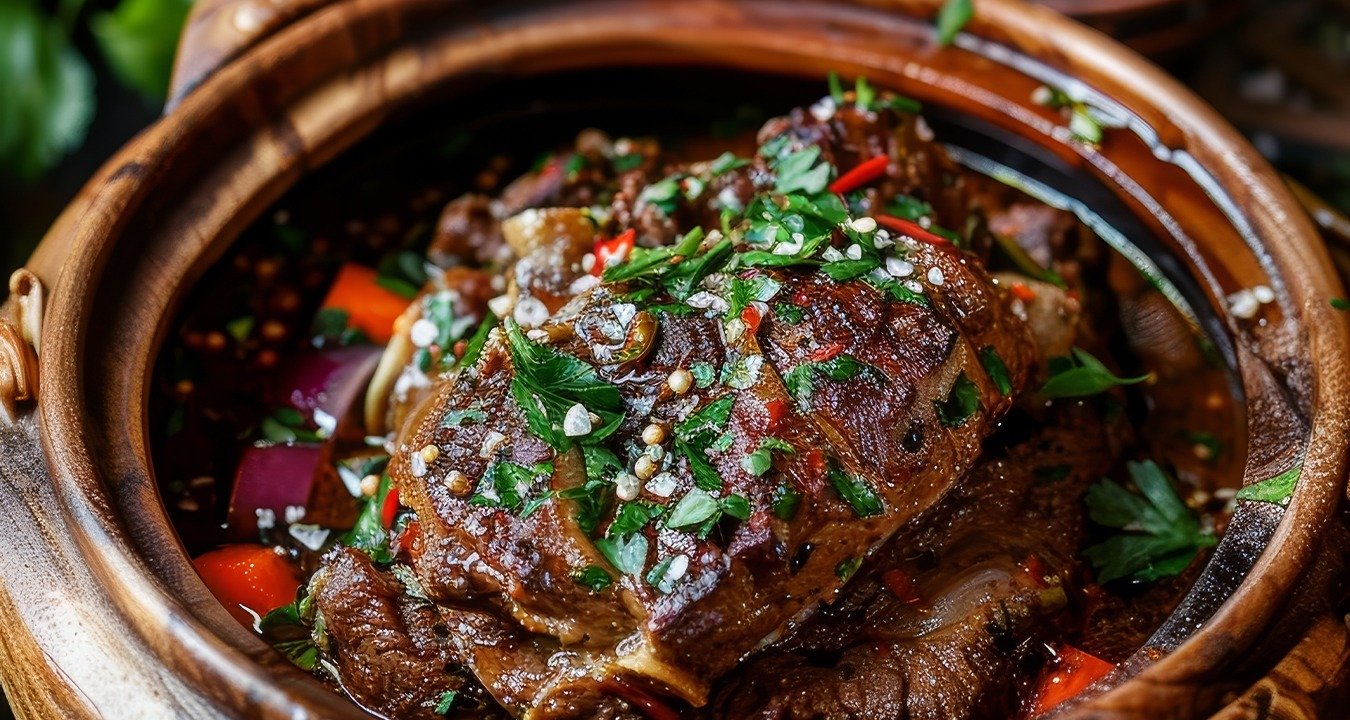Shuwa (شواء) is one of Oman’s most revered traditional dishes, known for its slow-cooked tenderness, deep smoky aroma, and rich blend of spices. This iconic dish is not just a meal—it is a celebration, a tradition passed down through generations, and a symbol of Omani hospitality.
Often prepared for Eid festivities, weddings, and grand gatherings, shuwa involves marinating large cuts of meat with a signature spice mix, wrapping it in banana or palm leaves, and slow-cooking it underground for up to 48 hours. The result is incredibly tender meat that absorbs the earthy smokiness of the cooking process, making it an unparalleled culinary experience.
The Cultural and Historical Significance of Shuwa
📍 Origin: Oman
📅 Commonly Prepared During: Eid al-Fitr, Eid al-Adha, weddings, and major celebrations
🍽 Main Ingredients: Lamb, goat, or camel meat, infused with Omani spices
Unlike everyday meals, shuwa is a dish of festivity and togetherness, reflecting the patience, craftsmanship, and communal spirit of Omani culture.
Why is Shuwa Special in Oman?
✔ A Symbol of Omani Hospitality – Traditionally served to guests as a sign of respect and generosity
✔ A Culinary Tradition Passed Down Generations – Each family has its own secret spice blend
✔ A Social Cooking Process – Families and communities come together to prepare shuwa, making it a collective experience
✔ A Test of Patience & Skill – The slow-cooking technique mirrors Oman’s cultural value of patience
During Eid celebrations, the preparation of shuwa is a community affair, with multiple families contributing their marinated meat to a shared underground oven (tanoor). This communal cooking tradition fosters strong social bonds and family connections.
🌟 Pro Tip: Shuwa is often prepared in large quantities and enjoyed over two to three days during festive occasions.
The Signature Meats of Shuwa
🥩 Traditional Meat Choices:
✔ Lamb – The most popular option, offering a delicate, tender texture
✔ Goat – Rich and slightly gamey, loved for its deep flavors
✔ Camel Meat – Occasionally used for a truly traditional Omani experience
Omani families prioritize fresh, high-quality meat, ensuring that the slow-cooking process enhances the natural richness and juiciness of the dish.
🌟 Pro Tip: Some families marinate the meat for up to 24 hours, allowing the spices to deeply penetrate and intensify the flavors.
The Unique Cooking Process of Shuwa
Shuwa is unlike any other slow-cooked dish. It follows a meticulous, multi-step process, involving spice infusion, leaf wrapping, and underground cooking.
The Underground Cooking Method (Tanoor Cooking)
🔥 How Shuwa is Traditionally Cooked:
✔ A deep pit (tanoor) is dug in the ground
✔ Wood and charcoal are burned until reduced to embers
✔ The marinated meat is carefully wrapped in banana or palm leaves
✔ The meat is placed in the pit, covered with sand, and sealed with mud or stones
✔ The meat cooks for 24 to 48 hours, absorbing the flavors of the spices and earth
Why Cook Shuwa Underground?
✔ Locks in moisture, resulting in fall-off-the-bone tenderness
✔ Enhances the smoky flavor, infusing the meat with an earthy depth
✔ Slow cooking ensures even heat distribution, preventing overcooking
🌟 Pro Tip: Each family marks their wrapped meat with a unique identifier (like a rock or symbol) before placing it in the communal tanoor.
How Shuwa is Traditionally Served
Shuwa is best enjoyed in a traditional Omani feast, accompanied by a variety of side dishes and sauces that complement its rich, smoky flavors.
🍽 Common Ways to Serve Shuwa:
✔ With Spiced Rice (Maqbous or Biryani-style) – The most authentic pairing
✔ With Omani Bread (Khubz Rakhal) – A thin, crispy flatbread used to scoop the meat
✔ With Fresh Salads and Yogurt-Based Sauces – To balance the richness
✔ With Dakhous (Omani Tomato Sauce) – A tangy, mildly spiced dipping sauce
🌟 Pro Tip: Some families mix shuwa meat directly with rice, allowing the grains to absorb the flavorful juices.
Modern Adaptations of Shuwa
While traditional shuwa is still cooked underground, many modern Omani households have adapted the dish for convenience.
Contemporary Cooking Methods:
✔ Oven-Baked Shuwa – Slow-cooked at 120°C – 140°C (250°F – 275°F) for 5-7 hours
✔ Pressure Cooker Shuwa – Significantly reduces cooking time while maintaining tenderness
✔ Slow Cooker Shuwa – Allows for easy, low-maintenance cooking with a fall-apart texture
🌟 Pro Tip: To mimic the smoky tanoor flavor, some chefs incorporate smoked paprika or liquid smoke into the marinade.
Where to Experience the Best Shuwa in Oman
If you’re visiting Oman, sampling authentic shuwa is a must. Here are some of the best places to try this legendary dish:
🥘 Traditional Omani Restaurants:
✔ Bin Ateeq (Muscat) – Famous for serving authentic, slow-cooked shuwa
✔ Bait Al Luban (Mutrah, Muscat) – A premium Omani dining experience featuring traditional shuwa
✔ Rozna Restaurant (Muscat) – Offers shuwa with fragrant, spiced Omani rice
🏡 Homemade Shuwa:
The best shuwa is homemade and is often shared with guests during Eid celebrations. If you’re visiting Oman during festival season, you may be invited to an Omani home, where you’ll experience shuwa in its most authentic setting.
🌟 Pro Tip: If you get the chance to try home-cooked shuwa, don’t miss it—it’s an experience you won’t forget!
Final Thoughts: Why Shuwa is a Must-Try Dish
Shuwa is more than just food—it is a celebration of Omani heritage, patience, and craftsmanship. Whether you experience it at a street market, in an upscale restaurant, or at an Omani family gathering, this dish is a true culinary masterpiece that reflects the heart of Oman’s hospitality and rich traditions.
🔥 Next time you’re in Oman, make sure to savor the unforgettable flavors of Shuwa!



